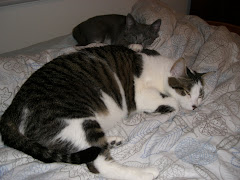A discussion over at majorcase-ci about the love/hate relatinship people have with their computers made me think of this essay I wrote several years ago for a intro to writing class I took in college. I never have been able to find a good way to end it, so any ideas and/or constructive criticism is welcome.
Have you ever been convinced that your car is secretly trying to drive you clinically insane? Has it ever broken down for no apparent reason, then miraculously (just when someone else is around to inspect the problem) starts ever so gracefully? Have you ever contemplated the idea that your seemingly harmless computer is in cahoots with your car; that the accident with your nearly finished twenty page paper was a calculated move to short out what working circuits you have left?
The assumption that I have considered all these possibilities would be an understatement. My rational mind tells me that all of the disappearing papers and the cars that won’t start for no reason are just simple accidents, but my outlandish, and maybe a little paranoid, mind screams that even though these incidents may be coincidence now, in the future our cars, computers, or whatever man might create that is close or identical to human will eventually turn on it’s creator. The interesting question, though, is why will they turn against us? Will it be because these humanoid, walking, talking, maybe even feeling computers were made (at no fault of the maker, of course) evil? Or will that be man’s story when the creation wants freedom from the job it was made to do?
Let’s imagine this future.
The year is 2021. The third World War (the apocalyptic one everyone’s been debating since World War II) has ended, leaving Earth in turmoil and nearly obliterating all living creatures, and making the few that remain a prestigious sign of wealth. For those who are too unfortunate to afford or find a real animal can have a nearly perfect replica made. You want it, they build it: a cat, a dog, a mongoose, or even a human.
Yes, that’s right a human, or at least a sophisticated android that could easily pass as a real person. They were made to be servants to the real humans who fled Earth to the new colonies on Mars. These creations or creatures are feared by the government and have been banned from Earth.
But, as with any system, there are those who fall through the cracks and make their way to Earth only to be hunted, found, then killed…oh excuse me, I mean “retired” by bounty hunters in a police unit designed solely for this purpose.
This prophetic and grim proposal for our future was conjured by Philip K. Dick in his 1968 novel, Do Androids Dream of Electric Sheep? The story of the struggle between humans and androids could be very cut-and-dry, with the humans playing the never wrong or flawed heroes and the androids as the diabolical machines that are simply hell-bent on obtaining domination over man. Instead of using this predictable and boring set-up, Dick blurs the line between man and machine and dangles in front of the reader the question: what does it mean to be “human”?
Dick intertwines the ideas of what it is to be human and what it means to be mechanical or methodical in all of his characters, lacing thoughts of natural human wishes and rights into the minds of the androids, while leaving the humans unable to feel anything unless hooked up to a machine. Man can change his moods at a push of a button with an “Empathy Box” and have every emotion planned that is necessary for that day.
Rick Deckard, the protagonist of the novel, starts his morning not by picking out a suit, but by picking out his attitude. “‘I’ll dial what’s on my schedule for today.’ Examining the schedule for January 3, 2021, he saw that a businesslike professional attitude was called for” (4). In some ways this could be rather useful; you could without force simply smile and nod at a screaming authority figure, but all the possible emotions that could boil over at any given time to any given incident would be inactive. Iran, Deckard’s wife, upon thinking of death cannot feel any sadness: “‘So although I heard the emptiness intellectually, I didn’t feel it. My first reaction consisted of being grateful we could afford a Penfield mood organ. But then I realized how unhealthy it was, sensing the absence of life […] and not reacting’” (5). Man in Dick’s created world has made an android of himself by surrendering the outburst of emotion that is so typically human.
The androids on the other hand just simply want to know what it is like to be human and wish to feel the emotions and experiences that man is so quick to neglect. “‘Androids can’t bear children,’ she then said. ‘Is that a loss?’” Rachel, an android, reflects on the life of an android. “ ‘How does it feel to have a child? How does it feel to be born, for that matter? We’re not born; we don’t grow up; instead of dying from illness or old age; we wear out like ants,’” (193). Even though she is physically incapable of experiencing the full emotions of humans, she knows they are vital to what it means to be human.
Subscribe to:
Post Comments (Atom)


1 comment:
The first thing I think of when discussing androids vs. humans is Isaac Asimov's Robot series. Asimov is my favorite sci-fi author because he made everything seem so believable.
I figure if you're familiar with Philip K. Dick you'd be familiar with Asimov. I've always been fascinated by tales of technology getting smarter than the humans who create it.
Technology frees us and helps us but also, becomes so important it becomes essential to life. I couldn't do my job very well if I didn't have a laptop. People used to do it all the time but I would find it to be a hindrance to my getting the job done.
I couldn't live without air conditioning either. Having asthma, sometimes the humidity sets off an attack. Being in air conditioning prevents that from happening.
Don't even talk about cars, cell phones and other gadgets. Maybe it's already happening?
All I know is I rely on my computer and the internet way too much to function very well without it.
Post a Comment